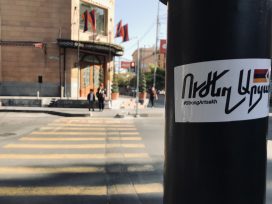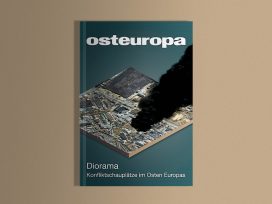Abstracts Osteuropa 11/2005
Gerhard Gnauck
Instinct for statesmanship or national complex? What Europe has to expect from Poland’s new president
Since Lech Kaczynski’s surprise victory in the Polish presidential election, observers have been pondering where he will lead Poland in its domestic and foreign policies. A look at his political career, which began in the Solidarity Movement, suggests that two scenarios are possible. Either Kaczynski will reveal an instinct for statesmanship, break with his vision for reshaping Poland, and raise the common good to his highest guiding principle, or he could prove to be a politician who is driven by personal injury and complexes and suspicious of others.
Peter Oliver Loew
Twins caught between Endecja and Sanacja. The new centre-right government and its historical roots
Beneath the surface of political thought in Poland, two twentieth-century heroes of the struggle for independence lie slumbering: Roman Dmowski und Jozef Pilsudski. The new governing party in Poland, Law and Justice, is not unimpressed by these role models: National Democratic traits as well as authoritarian tendencies indicate that in the coming years traditionalist patterns of thought will dominate politics. Whether this is a suitable prescription for what ails Poland at present remains to be seen.
Stefan Garsztecki
A political earthquake in Poland? German fears, Polish contexts
The results of the Polish parliamentary and presidential elections have met with a good deal of criticism in Germany. Many observers fear that liberal society, even Polish democracy, is in danger. Moreover, all signs point to stormy weather in German-Polish relations, to say nothing of the effects of the Law and Justice Party’s state-centric programme on the European Union. These fears are exaggerated. The brothers Kaczynski stand for conservative but not nationalist policies.
Sabina Wölkner
On the brink of an ice age? Poland, Russia, and the Polish Law and Justice Party
Relations between Russia and Poland are strained by a number of historical reasons that go back for centuries. Concern has been expressed that the dual victory of Russo-sceptical, national-conservative forces in the Polish general and presidential elections could lead to increased tensions between Warsaw and Moscow. There is little evidence for this. Growing trade between the two states, Poland’s integration into the European Union, and foreign policy pragmatism constitute hard political realities that even the Kaczynski camp is forced to recognize. Nevertheless, unsolved historical issues, such as the murder of thousands of Polish officers in Katyn in 1940 and Moscow’s ambiguous attitude toward the dictatorship in Belarus, offer considerable potential for conflict.
Pavel Pecinka
Green ties. The Czech Greens between Prague and Brussels
In eastern Europe, Green parties have not been able to achieve the degree of importance that some of their sister parties enjoy in western Europe. Even in the Czech Republic, where social conditions for an ecological movement are rather good, the Greens have remained largely marginal. On top of that, the German Greens, junior party in a national governing coalition, have avoided their Czech counterparts due to fundamental political differences. Only after a change of leadership in the Czech Green Party did the European Green Party begin to support their Czech colleagues. But the new leadership under Jakub Patocka has continued to resist EGP efforts to exert influence on the Czech party. The EGP now finds itself confronted by a group around Patocka, which, together with the Finnish, Hungarian, and Latvian Greens, is forming a new front against the EGP leadership.
Michael W. Bauer
Training the ship-hands of state. Administration study in east-central Europe
The change in systems in east-central Europe was accompanied by a reform of public administration studies. In the curricula of most countries, training in public business administration has gained in significance. Only a few countries have continued to cling to the traditional dominance of an educational background in jurisprudence. The probability that a change in concept or approach will occur depends on the extent of political transformation, the replacement of elites, and the conditions for public access to national services. Adjustments in administration studies have implications for the public’s understanding of the state and the way states behave.
Martin Lücke
Vilified, venerated, forbidden. Jazz during Stalinism: Between repression and freedom
Five years after jazz premiered in western Europe, it also debuted in the Soviet Union and, within a short period, developed into a popular form of music. The Stalinist regime’s attitude toward jazz, a musical style with strong connotations of freedom, moved from censorship and restrictions to state sponsorship. Domestic, foreign, economic, and ideological factors were responsible for this shift. However, throughout the entire Stalinist era, jazz remained an element of Soviet cultural life.
Henrike Schmidt, Katy Teubener
Monumentalization and imagery of fear. Official discourse about the Internet in Russia
Information technology is control technology. Access to the means of production in the opinion-making media industries is highly important for political, social, and private communication. The revolutionary significance of the Internet lies in its potential to decentralize the distribution of information. This feature of a worldwide data network presents a challenge to those who seek greater state control. This goes for the Internet in Russia, whose growing popularity threatens the state’s power over the media and public opinion. Discussions of whether it is necessary and possible to control the Internet are growing more frequent. In debates over freedom and censorship in Russia’s part of the World Wide Web, the state’s sovereignty of interpreting this medium for Russian culture is proving to be as effective as measures for regulating Internet technology.
Dagmar Burkhart
The phantasm of the great coat. Gogol’, Timm, Makanin
One of the main yearnings of mankind is undoubtedly to desire “the other”, and in the process, the ego functions as an interface between an internal and an external alter ego or stranger. Three different texts – Nikolai Gogol”s novella The Great Coat (1842), Vladimir Makanin’s novel The Underground or A Hero of Our Times (1998), and Uwe Timm’s story “The Great Coat” (1999) – share a psychopoetic motivation based on the phantasm of a great coat that is oriented to “the other”. Alongside the central theme of a great coat, which bears not only features of “the other” but those of a congruent doppelgänger or a complementary half, other aspects up for discussion in these works include religion and ethics, philosophy and metapoetics, as well as ecology and criticisms of civilization. Such hermeneutic observations shed light on the “inter-textuality” of philosophy, psycho-sociology, and poetics.
Karlheinz Kasper
Where do we come from? Where are we going? Russia and its writers between West and East
In Russia, the debate over the roots and evolution of national identity refuses to abate. Politicians, academics, and artists are seeking new perspectives for Russia’s frail, young democracy. Vasilii Aksenov and Viktor Pelevin, idols for the 1960s and 1990s generations respectively, have published two novels (neither of which has been translated into German) depicting completely contradictory concepts for a Russian way. Aksenov in Vol’ter’yantsy i vol’ter’yanki looks to the West. Pelevin in Svyashchnnaya kniga oborotnya to the Tao-influenced East.
Published 1 December 2005
Original in German
Contributed by Osteuropa © Osteuropa
PDF/PRINTNewsletter
Subscribe to know what’s worth thinking about.



